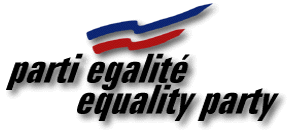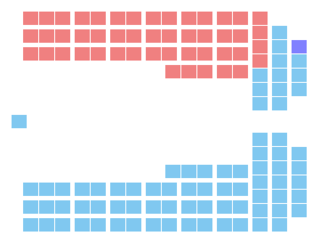The Parti Québécois is a sovereignist and social democratic provincial political party in Quebec, Canada. The PQ advocates national sovereignty for Quebec involving independence of the province of Quebec from Canada and establishing a sovereign state. The PQ has also promoted the possibility of maintaining a loose political and economic sovereignty-association between Quebec and Canada. The party traditionally has support from the labour movement, but unlike most other social democratic parties, its ties with organized labour are informal. Members and supporters of the PQ are nicknamed péquistes, a French word derived from the pronunciation of the party's initials in Quebec French.
The politics of Quebec are centred on a provincial government resembling that of the other Canadian provinces, namely a constitutional monarchy and parliamentary democracy. The capital of Quebec is Quebec City, where the Lieutenant Governor, Premier, the legislature, and cabinet reside.

The Action démocratique du Québec, commonly referred to as the ADQ, was a right-wing populist and conservative provincial political party in Quebec, Canada. On the sovereignty question, it defined itself as autonomist; it had support from nationalists and federalists. Its members were referred to as adéquistes, a name derived from the French pronunciation of the initials 'ADQ'.

Claude Ryan, was a Canadian journalist and politician. He was the director of the newspaper Le Devoir from 1964 to 1978, leader of the Quebec Liberal Party from 1978 to 1982, National Assembly of Quebec member for Argenteuil from 1979 to 1994 and Minister of Education from 1985 to 1989.

The Equality Party was a political party in Quebec, Canada, that promoted the use of English in Quebec on an equal basis with French. Four Equality Party members were elected to Quebec's National Assembly in 1989, as part of an anglophone reaction to changes made by the governing Liberals to Quebec's language law. The party had no success in subsequent elections, and stopped organizing after the 2003 Quebec election.

The 1998 Quebec general election was held on November 30, 1998, to elect members of the National Assembly of the Province of Quebec, Canada. The incumbent Parti Québécois, led by Premier Lucien Bouchard, won re-election, defeating the Quebec Liberal Party, led by Jean Charest.

The Parti unité nationale, formerly the Parti démocratie chrétienne du Québec, was a social conservative political party in Quebec, Canada. It was founded in 2000 by Roman Catholics associated with the Centre d’Information nationale Robert Rumilly. The founding leader of the party was Gilles Noël. The party's leader since 2010 has been Paul Biron, a retired engineer, whose brother, Rodrigue Biron, was leader of the conservative Union Nationale party from 1976 to 1980.

The New Democratic Party of Quebec is a federalist and social-democratic provincial political party in Quebec, Canada. The party is a revival of the comparable Nouveau Parti Démocratique du Québec, which existed in various forms as the federal New Democratic Party (NDP)'s provincial affiliate in Quebec from 1963 to 1991. The current party, however, is not affiliated with the federal NDP. The modern party was registered on 30 January 2014.
The History of the Quebec sovereignty movement covers various movements which sought to achieve political independence for Quebec, a province of Canada since 1867.

The Union nationale was a conservative and nationalist provincial political party in Quebec, Canada, that identified with Québécois autonomism. It was created during the Great Depression and held power in Quebec from 1936 to 1939, and from 1944 to 1960 and from 1966 to 1970. The party was founded by Maurice Duplessis, who led it until his death in 1959.

The 2007 Quebec general election was held in the Canadian province of Quebec on March 26, 2007 to elect members of the 38th National Assembly of Quebec. The Quebec Liberal Party led by Premier Jean Charest managed to win a plurality of seats, but were reduced to a minority government, Quebec's first in 129 years, since the 1878 general election. The Action démocratique du Québec, in a major breakthrough, became the official opposition. The Parti Québécois was relegated to third-party status for the first time since the 1973 election. The Liberals won their lowest share of the popular vote since Confederation, and the PQ with their 28.35% of the votes cast won their lowest share since 1973 and their second lowest ever. Each of the three major parties won nearly one-third of the popular vote, the closest three-way split in Quebec electoral history until the 2012 election. This was however, the closest three-way race in terms of seat count. Voter turnout among those eligible was 71.23%, a marginal difference from the previous general election in 2003.
The Parti de la démocratie socialiste was a provincial political party in Quebec, Canada.
The Parti indépendantiste was a political party promoting the independence of Quebec from Canada.
The Green Party of Quebec (GPQ) is a Quebec political party whose platform is the promotion of green politics. It has not won any seats in the National Assembly of Quebec. Its platform is oriented towards promotion of green values, sustainable development, and participatory democracy.

The Coalition Avenir Québec is a Quebec nationalist, autonomist and conservative provincial political party in Quebec.

The 2014 Quebec general election was held on April 7, 2014 to elect members to the National Assembly of Quebec. The incumbent Parti Québécois which had won a minority government in 2012 was defeated by the Quebec Liberal Party under Philippe Couillard who won a majority government of 70 seats, while the incumbent Parti Québécois finished second with 30 seats, becoming the first single-term government since Jean-Jacques Bertrand's Union Nationale government was defeated in 1970. Pauline Marois electoral defeat marked the shortest stay of any Quebec provincial government since the Canadian Confederation. It marked the lowest seat total for the Parti Québécois since 1989 and its smallest share of the popular vote since its inaugural run in 1970, as Premier Pauline Marois lost her own riding. The Coalition Avenir Québec under François Legault made minor gains in terms of seats despite receiving a smaller share of the popular vote than in the previous election. Québec solidaire won an additional seat, though co-spokesperson Andrés Fontecilla failed to win his riding. This election saw the return of the Liberals to power 2 years after their defeat in 2012. To date this is the last election where the Liberal Party won a majority of seats in the Quebec Assembly.

The 2018 Quebec general election was held on October 1, 2018, to elect members to the National Assembly of Quebec. The election saw a landslide victory for the Coalition Avenir Québec (CAQ) led by François Legault, which won 74 of 125 seats, giving the party a majority and unseating the Quebec Liberal Party. The Liberals became the Official Opposition with 31 seats.

Citoyens au pouvoir du Québec is a minor political party in the Canadian province of Quebec. The Party gave its support to the Anti-mask movement during the COVID-19 pandemic and was accused of having ties with far-right group La Meute.

Changement Intégrité pour notre Québec (CINQ) is a minor political party in the Canadian province of Quebec founded in October 2016. Its stated mission includes working for equality between men and women, promoting transparency and democratic accountability, and "stopping the transfer of wealth from the middle to the 'upper' class". The party's proposals include efforts to counter corruption and political interference in the judiciary, and massive investments in education and healthcare.

The 2022 Quebec general election was held on October 3, 2022, to elect the members of the National Assembly of Quebec. Under the province's fixed election date law, passed in 2013, "the general election following the end of a Legislature shall be held on the first Monday of October of the fourth calendar year following the year that includes the last day of the previous Legislature", setting the date for October 3, 2022.











